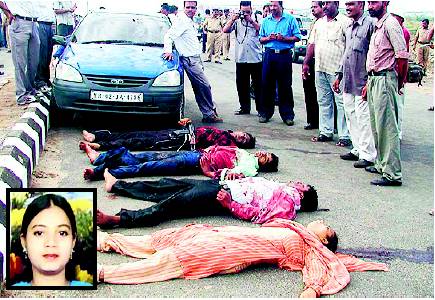 New Delhi, Oct 8: Suspended Gujarat cadre IPS officer D G Vanzara, who created ripples last month by declaring that he would expose those really responsible for "fake encounter" cases, has refused to follow through his sensational statement.
New Delhi, Oct 8: Suspended Gujarat cadre IPS officer D G Vanzara, who created ripples last month by declaring that he would expose those really responsible for "fake encounter" cases, has refused to follow through his sensational statement.
The DIG, who is in jail for allegedly staging encounters, has refused to elaborate on his letter of September 1 where he threatened to call a spade a spade and expose "real culprits behind encounter cases", CBI sources said. "I have nothing to add to what I have already written," sources quoted Vanzara bluntly telling the CBI team which met him inside jail late last month. When pressed, Vanzara said it was for the CBI to do the follow-up.
In his letter, Vanzara had defended himself and 31 other police officers who are in jail for allegedly carrying out extra-judicial killings, saying that they "simply acted and performed their duties in compliance of (sic) the conscious policy" the Narendra Modi government had laid down in response to the growing threat of jihadi terrorism.
He had stressed that the "pro-active policy of zero tolerance for terrorism" was adopted by the government of Gujarat at the highest level of its hierarchy".
The letter instantly set off speculation whether the jailed IPS officer, who appeared to be smarting under the feeling of having been abandoned by the Gujarat government, was planning to implicate his political bosses. That he attacked Amit Shah, former home minister of Gujarat and a close aide of Modi, who is also a co-accused in two encounter cases, only heightened the interest in what Vanzara, a self-confessed acolyte of the Gujarat CM until he dropped the letter bomb, might do next.
Given the build up, Vanzara's sudden coyness will come as a surprise. To the extent the outburst against Shah was attributed to the machinations of those who allegedly stoked his feeling of letdown for political purposes, the sudden switch to neutral gear may be seen as a success of counter-measures.
Meanwhile, in the Ishrat Jehan case, one of the "fake encounters" Vanzara and his colleagues have been accused of, CBI is likely to tell the trial court that it has not found anything suggesting that the college student from Mumbra near Mumbai had criminal antecedents.
The killing of Ishrat along with three alleged terrorists has been the subject of a raging controversy, with both Gujarat Police and IB maintaining that she was part of a fidayeen cell of Lashkar-e-Taiba.
CBI's finding falls tantalizingly short of proving or disproving the version of Gujarat Police and IB which was subsequently corroborated by Pakistan-born American jihadi David Coleman Headley. Headley, who cased Mumbai and other targets for Lashkar, had quoted Lashkar commander Zaki-ur Rahman Lakhvi to say that Ishrat was an LeT operative.
In its supplementary charge-sheet likely to be filed by October 20, CBI is also likely to tell the trial court that it failed to ascertain the antecedents of two of those who were killed along with Ishrat in the June 2004 encounter; particularly whether they were Pakistanis as claimed by Vanzara's team.
Gujarat Police and IB have claimed that Zeeshan Johar and Amjad Ali Rana were sent from Pakistan as part of a Lashkar plot to kill BJP leaders, including Modi and L K Advani.
Meanwhile, CBI on Monday examined BJP general secretary Ramlal in connection with the sting operation of a freelance journalist showing BJP leaders making efforts to dilute probe and judicial process in Tulsiram Prajapati case. CBI had earlier examined Prakash Javadekar and Bhupender Yadav of the BJP in the case.






Comments
Add new comment